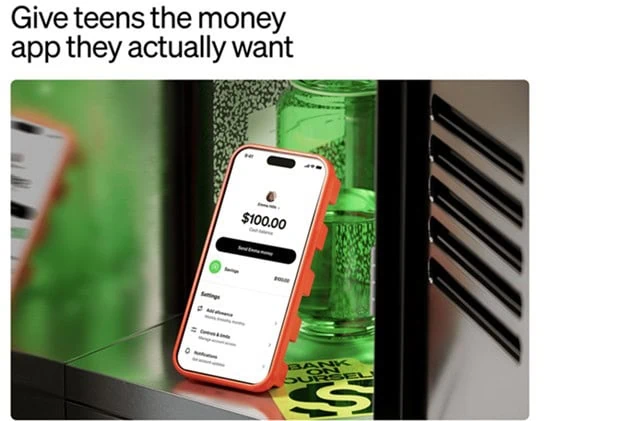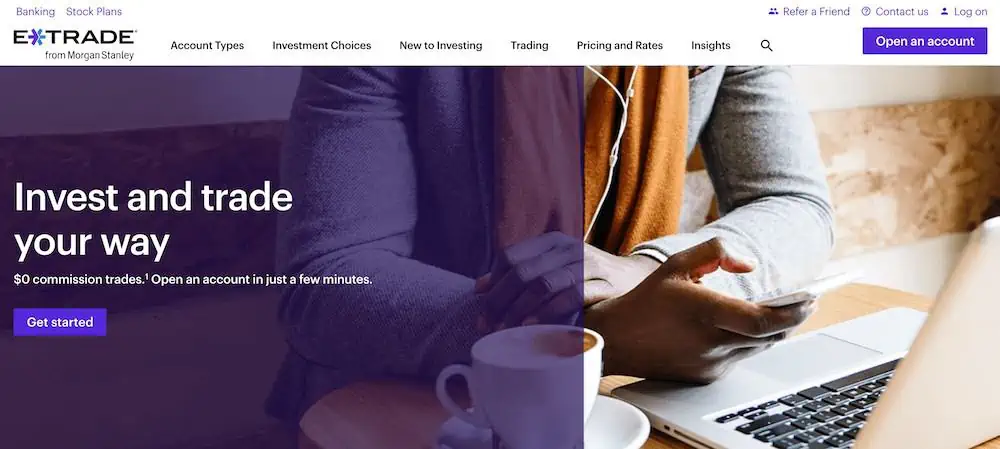Whether you’re a long-time cryptocurrency enthusiast yourself or your child has approached you with a desire to invest in cryptocurrency, you’re likely wondering if there are ways for kids to own crypto.
The short answer is yes. However, your child can’t just sign up for a crypto wallet and start purchasing cryptocurrency for themselves the same way an adult could.
Today, we will explain how you can open a crypto investment account for a minor. We’ll also go over other important information about crypto for kids, such as why kids may want to invest in crypto, if major crypto exchanges offer custodial accounts, crypto apps for kids, and more.
Crypto Accounts for Minors—Our Top Picks
|
Primary Rating:
4.3
|
Primary Rating:
4.5
|
|
No monthly fees.
|
No annual, opening, or closing fees and commission-free equity trading.
|
Can Kids Invest in Cryptocurrency?
There isn’t a minimum age requirement to own cryptocurrency. However, most major crypto platforms, including traditional brokerage firms, won’t let a child buy crypto until they become an adult.
Therefore, if a minor wants to invest in the crypto space, they’ll almost certainly need to enlist the help of a parent or guardian. Adults can help kids set up a crypto investment account and help the child invest money in cryptocurrencies. Alternatively, some apps let kids earn crypto.
Is Crypto a Good Long-Term Investment for Kids?
Diversification is essential for one’s investment portfolio at any age. From that perspective, crypto might be an excellent long-term investment to add to a child’s portfolio. Investing involves risk. Investing in crypto is no different. That’s why it should be part of a well-rounded portfolio—most experts say no more than 5%—rather than having a crypto hardware wallet hold the entire savings for a child.
Many people believe blockchain technology to be the future of money. And while crypto has been extremely volatile in the past, the top coins have still performed much better than other investments over the longer term.
Just remember: Past performance is no indication of future returns. Whatever crypto you and your child end up investing in, make sure to do your research beforehand.
Why Invest in Crypto for Kids?
When kids invest in crypto, they’re able to accomplish several things at once:
- Improve their financial literacy
- Invest for their future
- Depending on their age, learn about blockchain technology
Once your children have mastered basic money management concepts, such as saving in a piggy bank, they may enjoy buying crypto to learn about how financial markets work. A child can see how an investment grows or shrinks and better understand the concept of risk and reward with investments.
Many minors find the concept of crypto interesting, and some guided firsthand investing experience is a great way to learn more. There are even gamified crypto apps that make earning crypto fun. The more you keep your child engaged, the likelier they’ll want to keep improving upon their financial literacy.
Furthermore, given a child’s long time horizon for investments, if they own crypto now, it might grow substantially in value by the time it’s needed for expenses.
Can I Open a Crypto Account for My Child?
Yes, you can open a crypto account for your child if it’s a custodial account, joint account, or another type of account that allows the child to earn crypto without directly buying it. Minors cannot buy, sell, or trade any type of securities. But a parent or custodian can buy crypto on a child’s behalf, or let them earn crypto without purchase.
How to Open a Kids Crypto Investment Account
Opening a crypto investment account for children is relatively easy once you understand how the accounts work and the investments you want. Follow the steps below.
1. Choose your account for your crypto investments
There are a couple different types accounts you can consider: namely, investing apps and custodial accounts.
Investing apps, specifically those pertaining to kids and teens, often bundle investing capabilities with other financial features such as saving, spending, and budgeting.
Teens Can Invest in Bitcoin2 With Cash App Families

- Platforms: Web, mobile app (Apple iOS, Android)
- Price: Free* (no monthly fees)
Does your teen need to start learning smart saving, spending, and even investing habits? Cash App Families can accomplish all three—with no monthly fees—putting the power of Cash App into your teen’s hands while keeping their financial safety firmly in yours.
Teens get an account with a designable Cash App Visa debit card, which they can use to spend money where Visa is accepted. Meanwhile, access to Cash App allows them to save money toward specific goals, send money to friends, accept offers for instant discounts at their favorite places, and check out securely in stores and online by using a QR code.
If your teen direct-deposits $300 or more each month, they’ll also unlock a bevy of other features, including getting paid two days earlier, no ATM fees¹ when withdrawing from more than 40,000 in-network ATMs, and one waived out-of-network ATM withdrawal per month.
Cash App Families even has an investing feature with fractional shares, allowing kids to purchase as little as $1’s worth of stocks and Bitcoin (parent permission is required).²
Meanwhile, parents/guardians who sponsor the teen** enjoy some of the best oversight features among teen debit cards. You can monitor your teen’s activity from your own Cash App or receive real-time transaction alerts for their payments and purchases. You control which features—stocks, Bitcoin², sending money, the Cash App Card—your teen can access, and certain spending categories are auto-blocked for teens. can also send money for allowance whenever they want, and built-in tools allow parents and teens to budget and save together.
Parents/guardians must download Cash App (also free), then invite their teen to create a sponsored account. Cash App Families can be used by teens ages 13-17. Use our link to learn more about or sign up with Cash App today.
Custodial accounts typically hold the same securities as a traditional brokerage account, such as stocks or mutual funds. Only very risky investments, like futures or derivatives, aren’t allowed. Uniform Transfers to Minors Act (UTMA) accounts can also hold real estate and other types of investments.
And increasingly, custodial accounts support cryptocurrencies. These accounts might not be able to hold all digital assets, but some can hold major cryptocurrencies including Bitcoin and Ethereum. Likewise, a custodial account from E*Trade allows you to gain exposure to cryptocurrency without directly owning and storing it. Instead, you can consider owning securities that track or own assets tied to cryptocurrency, such as the several ETF and trust providers offering exposure to various cryptocurrencies.
Adults make the investment decisions for custodial accounts, but the assets belong to the beneficiaries and the accounts transfer to them once they reach the age of majority. After the account is transferred, the new adult has full access to the account and can choose to continue investing or withdraw some or all of the money to use toward any expense.
Own cryptocurrency-linked securities with a free E*Trade custodial account

- Platforms: Web, mobile app (Apple iOS, Android)
- Price: No monthly fees or trading commissions on stocks and ETFs through E*Trade’s Custodial Account
Most people know E*Trade as one of the leading providers of individual brokerage accounts, but you can also put the powerful platform to work saving for your child’s future, though a custodial account (and even a custodial IRA).
E*Trade’s custodial account for teens (and generally any minor) allows you to open up a custodial account that offers the chance to build a personalized portfolio through thousands of stocks, bonds, ETFs, and mutual funds (including cryptocurrency related securities offered by E*Trade), or you can have E*Trade select your holdings for you through its Core Portfolio robo-advisory service (minimum account size of $500 is needed to use this product). Further, you can choose to open a traditional custodial IRA or a custodial Roth IRA for children under age 18 who have earned income.
Just like with its individual brokerage accounts for adults, E*Trade custodial accounts offer zero-commission stock, ETF, and options trading.
And if you want to learn more about investing—or want your young one to learn alongside you—E*Trade also boasts educational resources, including articles, videos, classes, monthly webinars, and even live events.
To open a free E*Trade custodial account, click “Open Account” below.
- E*Trade is one of the best online and mobile trading platforms among discount brokers, offering a full range of investments (including professionally managed accounts). It allows you to invest in stocks, ETFs, mutual funds, options, bonds, futures, micro futures, and futures options.
- $0 commission trading for online U.S.-listed stocks, ETFs, options, mutual funds, Treasuries, and new-issue bonds. (Options have a 65¢ contract fee, or 50¢ at certain volume thresholds.)
- Help build your child’s future by managing their portfolio until they come of age without contribution or income limitations.
- Get easy access to your cash with a free debit card, checking, and Bill Pay
- Opening an account is easy and only takes a couple of minutes.
- Bonus: Get between $50 and $10,000* when you click the box below, then open and fund a new investment account using promo code "OFFER25."
- Excellent selection of available investments
- Commission-free mutual funds and Treasuries
- Automated portfolio builders and prebuilt mutual fund and ETF portfolios
- Separate apps for power users and casual users
- Limited availability of fractional shares (only in DRIP plans or robo-created portfolio)
- No direct cryptocurrency trading
Related: UTMA vs UGMA: Differences Between these Custodial Accounts
2. Review the Features
Costs
Costs will vary depending on the financial institution you use. Pay attention to any opening fees, monthly costs, and transaction prices every time you buy or sell a security. If fees are too high, those costs might cut too much into your profits, so you’ll generally want an account with low fees. But if the account is rich with features, it might be worth paying up rather than settling for a bare-bones free account.
Investment selection
Check that the crypto your child is most excited about is among the investment selections available in the account you’re considering.
While almost all crypto investment accounts will have well-known coins, such as Bitcoin, other coin options will vary depending on the account provider. And if you and your child are unsure about which crypto(s) to buy, you can always talk to an SEC-registered investment advisor for investment advice.
Depending on the account, you might also be able to purchase traditional investments, such as stocks, ETFs, and mutual funds. (And if so, you might be able to purchase certain crypto-themed funds in addition to cryptocurrencies.) While it’s possible to buy traditional investments elsewhere, it can be convenient to purchase all of the child’s investments in one place.
Security (hot vs. cold crypto wallets)
Hot wallets for cryptocurrency are any wallets that are connected to the internet—typically web-based, mobile, or desktop wallets. An advantage to hot wallets is that they are simple to use; you don’t need to transition between going online and offline to conduct transactions.
The major disadvantage is that hot wallets are less secure than cold wallets—basically, hardware, such as a USB stick, that’s not connected to the internet. Hardware wallets are designed to be nearly impossible to hack.
You can use hot and cold wallets together. While hot wallets work well for small to moderate amounts of crypto, if you own a significant amount, you should hold some in a cold wallet, too.
Decide if you want your kid’s crypto to be stored in a cold wallet, hot wallet, or both.
Crypto exchange being used
A cryptocurrency account should clearly state which crypto exchange is being used. As more exchanges pop up, it’s essential to use one that is registered and trusted.
Also, remember: The Federal Deposit Insurance Corporation (FDIC) doesn’t insure crypto companies. So if an exchange claims to be FDIC-insured, be wary.
3. Submit an application
You’ll need basic identification information about the child to get started, such as a birthday and Social Security number. You’ll also need to provide basic information about yourself.
4. Fund the account
You will need to fund your account with fiat currencies, such as U.S. dollars or euros. Other family members and friends can also contribute funds to the account as gifts to the minor. You and your child can use that money to buy your cryptocurrencies of choice.
Other FAQs About Crypto for Kids
Can you hold crypto as a minor?
Most major cryptocurrency exchanges require you to be an adult to open a trading account, meaning a minor can’t buy crypto on an exchange by themselves. However, there are still many ways a minor can hold crypto.
A parent can open a joint or custodial account where the minor can hold crypto. Alternatively, the minor can obtain crypto from locations other than a major exchange. For example, the minor might use an app that lets them earn crypto.
Some adults choose to buy and hold cryptocurrencies themselves with the intention of later selling the assets and gifting the fiat to their children once they become adults. Be aware that this method might have tax consequences.
Can you have a custodial account for crypto?
Yes, you can have a custodial account for crypto. The assets in the account legally belong to the beneficiary. Before applying for a custodial account, make sure it allows the digital assets the child wants to hold.
Does Coinbase have custodial accounts for minors?
No, Coinbase does not offer custodial accounts for minors. If a parent wanted to use Coinbase, they would have to purchase the cryptocurrency and simply earmark it to give it to the child later.
However, crypto accounts for minors can be opened elsewhere. If you want the crypto to belong to the minor in a way the adults can’t change their minds and maintain possession, open a custodial account for cryptocurrency on another platform.
Can you open a custodial account on Coinbase?
No, you cannot open a custodial account on Coinbase. Don’t confuse a “self-custodial crypto wallet” with a custodial account for a minor. There are custodial accounts that allow crypto, but you can’t open them on Coinbase.
Can minors have a crypto wallet?
While minors technically aren’t outlawed from having a crypto wallet, registered exchanges and other wallet providers typically won’t allow your child to sign up for one.
Related:
- 10 Best Free Debit Cards for Kids & Teens [Earn, Save & Spend]
- How to Invest as a Teenager [Start Investing as a Minor Under 18]
- 7 Best Investments for Kids [Investing for Children]
Disclosures
Cash App Families
Cash App is a financial services platform, not a bank. Banking services provided by Cash App’s bank partner(s). Prepaid debit cards issued by Sutton Bank. Member FDIC. See Terms and Conditions. Direct deposit and instant discounts provided by Cash App, a Block, Inc. brand.
* Free Cash App Cards come in black, white, pink, or glow-in-the-dark. Card use fees apply.
** To view the eligibility requirements for sponsoring a teen, please visit the Sponsored Accounts section of the Cash App Terms of Service.
*** Your balance is eligible for FDIC pass-through insurance through our Program Banks Wells Fargo Bank, N.A. and/or Sutton Bank, Members FDIC for up to $250,000 per customer when aggregated with all other deposits held in the same legal capacity at each Program Bank above, if certain conditions are met. Cash App is a financial services platform, and not an FDIC-insured bank. Prepaid debit cards issued by Sutton Bank, Member FDIC. See terms and conditions (https://cash.app/legal/us/en-us/card-agreement).
Cash App is a financial services platform, and not an FDIC-insured bank. Prepaid debit cards issued by Sutton Bank, Member FDIC. See terms and conditions.
¹ Cash App reimburses ATM fees for all in-network withdrawals when you deposit at least $300 monthly of Qualifying Deposits into Cash App, or spend $500 or more in Qualifying Purchases using your Cash App Card or Cash App Pay in a calendar month. Service fees may apply. See terms https://cash.app/legal/us/en-us/tos) for more details.
² Brokerage services provided by Cash App Investing LLC, member FINRA/SIPC, subsidiary of Block, Inc. Bitcoin services provided by Block, Inc. Bitcoin services are not licensable activity in all U.S. states and territories. Block, Inc. operates in New York as Block of Delaware and is licensed to engage in virtual currency business activity by the New York State Department of Financial Services. Investing and bitcoin are non-deposit, non-bank products that are not FDIC insured and involve risk, including monetary loss. Cash App Investing does not trade bitcoin and Block, Inc. is not a member of FINRA or SIPC. For additional information, see the Bitcoin and Cash App Investing disclosures. Additional fees for securities may apply such as regulatory fees and fees to transfer securities externally. Please see our House Rules for more information. Fractional shares investing may involve additional risks such as non-transferability. For additional information regarding the unique risks and limitations of fractional shares, please see your Investing Customer Account Agreement.
³ Customers can qualify for Cash App Green by spending $500 in Qualifying Purchases using your Cash App Card or Cash App Pay per month, or by depositing $300 of Qualifying Deposits per month. Eligibility restrictions apply to some benefits. See Terms and Conditions (https://cash.app/legal/us/en-us/tos) for more information. To earn the highest interest rate on your Cash App savings balance, you need to (a) have a Cash App Card, or sponsor one or more sponsored accounts, and qualify for Cash App Green or (b) have a sponsored account with sponsor approval. Customers can qualify for Cash App Green by spending $500 in Qualifying Purchases using your Cash App Card or Cash App Pay per month, or by depositing $300 in Qualifying Deposits per month. See terms and conditions for more information on how to qualify. If you are signed up to earn interest, Cash App will pass through a portion of the interest paid on your savings balance held in an account for the benefit of Cash App customers at Wells Fargo Bank, N.A., Member FDIC. Exceptions may apply. Savings yield rate is subject to change.










![9 Best Fidelity ETFs for 2026 [Invest Tactically] 25 best fidelity etfs](https://youngandtheinvested.com/wp-content/uploads/best-fidelity-etfs-600x403.webp)
![7 Best Growth Stocks to Buy for 2026 [Find Your Edge] 26 best growth stocks to buy 2025](https://youngandtheinvested.com/wp-content/uploads/best-growth-stocks-to-buy-2025-600x403.webp)
